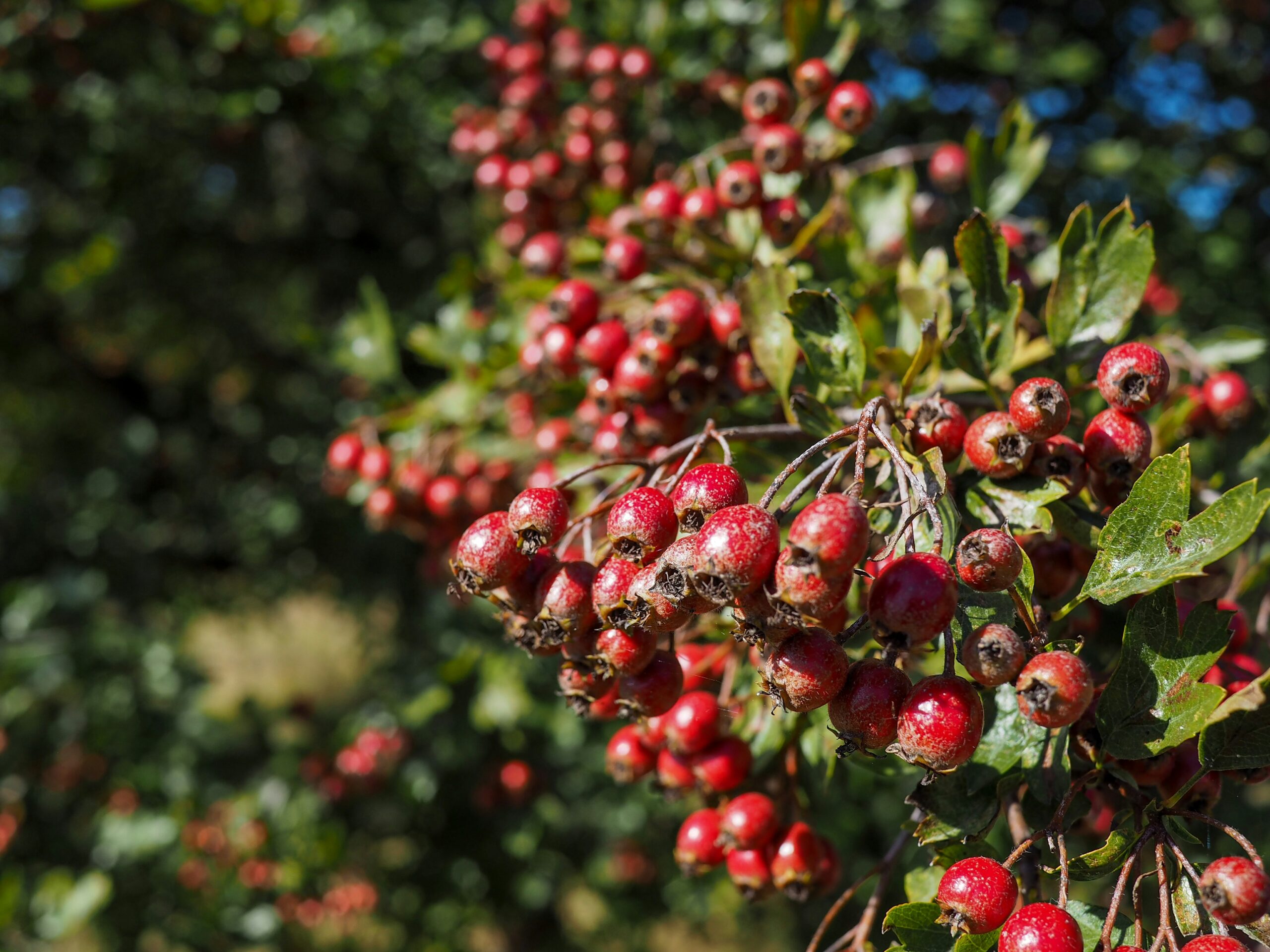Hawthorn is a very common plant in many parts of the world. Generally, it is possible to distinguish many species of plants that have inhabited Asia, Europe, or North America. The most common plant species has long stems covered with spiraling dark green leaves. The main distinctive features of the plant may include small, sharply pointed thorns and dark red, round fruit. When discussing hawthorn, hawthorn fruits have been used as food and medicine.
Nowadays, aqueous ethanolic extracts of leaves and flowers are used clinically in Europe and the USA due to their therapeutic properties. Hawthorn has its properties, as it contains chemicals of medicinal interest. Generally, hawthorn is commercially available in a variety of forms. As a rule, hawthorn tea and other preparations are available in pharmacies and other herbal shops. Hawthorn is one of the oldest known plants people use to support health. The fruit, as well as the flowers, are a rich source of many bioactive substances.
Recently conducted scientific studies prove the health-promoting properties of the plant. At the same time, it is important to remember that hawthorn does not substitute professional medical treatment and should be applied in combination with conventional procedures. Moreover, there are some contraindications to using the plant; thus, not everyone can benefit from its health-promoting properties. You have an excellent opportunity to learn more about hawthorn and its uses!

Hawthorn is classified as a medicinal plant in many countries. Modern research has recently confirmed that extracts of hawthorn fruit, flowers, and leaves have a wide spectrum of pharmacological activities. Various parts, such as fruit, leaves, and flowers of different Crataegus![]() species and their flowering tops, have been used as remedies for numerous conditions. The heart is the most frequently mentioned organ associated with hawthorn, but this plant has much more to offer, so it is worth knowing.
species and their flowering tops, have been used as remedies for numerous conditions. The heart is the most frequently mentioned organ associated with hawthorn, but this plant has much more to offer, so it is worth knowing.
Numerous scholars have researched hawthorn and its antioxidant activity. This plant is rich in polyphenols that can scavenge free radicals since they interact with diverse components. Numerous hawthorn species show antioxidant activity and subsequent health impacts on humans. The plant is categorized as highly antioxidative. Thus, hawthorn should be applied for a protective purpose. One can consume antioxidants through a diet or use supplements prescribed by a healthcare provider to protect the body from numerous diseases and slow aging.
As for the transformation of the available knowledge throughout the years, it should be noted that modern hawthorn products are one of the most widely used herbal supplements for cardiomedical goals, including cardiovascular protection. Hawthorn extracts are used for various complaints associated with the vascular system. Herbal preparations containing hawthorn can be used as an adjunctive therapy for chronic congestive heart failure![]() .
.
Among cardio medical goals, hawthorn is indicated to increase cardiac function, arrhythmias, and hypertension. Commercial hawthorn extracts can increase cardiac contractility, increase cardiac blood flow, and lower blood pressure. Hawthorn preparations also have a relatively strong diastolic effect on vascular smooth muscle, which suggests that hawthorn may reduce cardiac strain. Overall, the best-known health-promoting actions of hawthorn are undoubtedly concerned with its effects on the cardiovascular system.
Yet another advantage for the heart and cardiovascular system is the effect on the lipid profile of hawthorn. The lipid-lowering effect of hawthorn is a well-studied fact by specialists. The plant remedies have been shown to decrease triglycerides and total cholesterol. Next, the important part is that liver health is highly dependent on the lipid profile. Of course, people's health was also observed, and therefore, the human liver dysfunction and serum parameters improved.
Moreover, it needs to be mentioned that a tendency to decrease body weight and fat pad mass was observed. So, it is clear that the proper use of hawthorn flowers or hawthorn fruit decreases total cholesterol, meaning that cardiovascular health is further affected in a positive way, which is an additional advantage for people with hypercholesterolemia![]() .
.

When discussing hawthorn's health properties, one must admit it has a hypoglycaemic effect. A few studies have established that using the plant's leaf extract causes a significant decrease in blood glucose. It is possible to speak of the potential advantages of hawthorn preparations in managing blood sugar levels, and doctors and dietitians sometimes advise those who have diabetes to take them as medicine.
The effect in question is mainly achieved by phenolic and flavonoid compounds, which are important active substances needed to fight diabetes. In addition, components from hawthorn leaves have a positive effect on the heart muscle, which is also essential for diabetes patients.
So far, little information or research has been done on the anticancer effects of hawthorn. However, its bioactive substances have a beneficial effect on human cancer cells. Thus, hawthorn contains substances that highly inhibit the proliferation of breast cancer![]() and hepatocellular carcinoma
and hepatocellular carcinoma![]() cells. Its plant extract may also play an anticancer role by inhibiting tumor growth in the context of melanoma.
cells. Its plant extract may also play an anticancer role by inhibiting tumor growth in the context of melanoma.
Isolated hawthorn compounds are active and may be a promising drug for melanoma![]() treatment. In addition, its advantages relate to its high polyphenol content, showing strong antiproliferative activity toward human cancer cell lines.
treatment. In addition, its advantages relate to its high polyphenol content, showing strong antiproliferative activity toward human cancer cell lines.
Another useful property of hawthorn is its anti-inflammatory effect. The substances contained in the plant can suppress the activity of inflammatory factors. It can also inhibit colitis through its popular hawthorn preparation and other mechanisms, such as modifying the intestinal flora. The extract of hawthorn seeds also shows antimicrobial action against the pathogen of vaginitis, such as Gardnerella vaginalis![]() .
.
Thus, it can also inhibit the growth of fungi that cause inflammation, such as Candida albicans. It is also worth mentioning that hawthorn acid can be used to cure arthritis, which is very popular among older adults. In sum, hawthorn can be very efficient in treating different types of inflammation due to its universal anti-inflammatory effect.
Hawthorn's fantastic properties are not limited to its cardioprotective role. It is also a widely used herbal cure for indigestion. The plant's extracts enhance the motility of the digestive canal. The compounds found in hawthorn are beneficial in the digestive system since they have a stable shape. Those who suffer from indigestion due to a high-calorie diet can be treated with hawthorn products. In this case, the brain-gut axis is essential.
The preservation of the gastrointestinal tract is due to suppressing the disorders of lipid, energy, and amino acid metabolism. As a result of metabolism, hawthorn leads to an increase in gastrointestinal function. The hawthorn seed extract also increases the emptying of the stomach, the driving of the small intestine, and the effective handling of plasma gastrointestinal hormones.

It has been established that the organs of a healthy person can be preserved in good condition with a favorable combination of concomitant diseases. The use of tincture of hawthorn is also beneficial for their regular maintenance. The substances contained in the plant have a pronounced stimulating effect on the immune system. This property is more pronounced with higher doses of hawthorn extract. The flowers and fruits of this plant contain many antioxidants that are good for our health. Moreover, consuming hawthorn protects a person from developing many diseases.
Also, the components of hawthorn have a positive effect on the blood clotting system. The plant, in other words, has a blood-thinning effect. In experiments, individual compounds from hawthorn fruits prolong the plasma clotting process even at low concentrations. Thus, paying attention to the combined effect of hawthorn preparations on anticoagulants and antiplatelet agents is necessary.
Anticoagulants are a large group of agents whose main effect is to slow down the blood clotting process. They are necessary for several heart problems and prevent severe complications such as heart attack or stroke. These agents cannot be ignored in the therapy of venous thromboembolism.
Researchers have described the neuroprotective effects of hawthorn rather recently. The application of drugs from hawthorn has been reported to show considerable neuronal protective activity. Using different parts of the plant considerably decreased neurological deficits and neuronal damage. At the same time, it has also been argued that hawthorn may be a high-potential agent for neurodegenerative diseases (Alzheimer's disease![]() ).
).
The potential of hawthorn as a natural antidepressant![]() was also described. It was reported that the components of hawthorn limit the depressive behavior induced by stress hormones. The components from hawthorn leaves also may facilitate the recovery of motor function. In such a way, hawthorn is also important for the brain.
was also described. It was reported that the components of hawthorn limit the depressive behavior induced by stress hormones. The components from hawthorn leaves also may facilitate the recovery of motor function. In such a way, hawthorn is also important for the brain.
You can find various important components and bioactive compounds in hawthorn. The substances' content differs depending on the type of hawthorn and plant parts used. Even though no products from hawthorn are available on the market, Bioactive components in great quantity are characteristic of fruits, leaves, and flowers. It can be observed that hawthorn has a higher content of certain components than some popular fruits. The plant has high amounts of amino acids. Protein content exceeds that in apples. It also has a higher fiber content. Additionally, hawthorn has many important elements that guarantee you some health benefits.

Several vitamins can be obtained from various parts of hawthorn. Most of the good values provide us with vitamin C![]() , a natural antioxidant that will help us strengthen our immune system. One should note that the vitamins found in the hawthorn bush are easily available, as they contain organic acids, so the vitamin C contained will not be destroyed even when the product is heated. Additionally, it is possible to find minerals that are good for us. Namely, calcium, magnesium, potassium, and phosphorus are found in large quantities in hawthorn fruit.
, a natural antioxidant that will help us strengthen our immune system. One should note that the vitamins found in the hawthorn bush are easily available, as they contain organic acids, so the vitamin C contained will not be destroyed even when the product is heated. Additionally, it is possible to find minerals that are good for us. Namely, calcium, magnesium, potassium, and phosphorus are found in large quantities in hawthorn fruit.
Active chemical compounds that have many properties can assist in maintaining health. The fruit and pulp contain pectin in high concentration. Seeds of hawthorn contain high concentrations of lignans, natural components that act as antioxidants and anti-inflammatory agents. In comparison, the plant matter also has more antioxidants. As for the chemical compounds in the plant, flavonoids and organic acids are the most abundant components of hawthorn.
The largest scientific articles on hawthorn deal with polyphenolic components![]() as the most relevant phytochemicals and bioactive compounds that benefit humans. Such elements are flavones and phenolic acids, and consequently, most preparations based on hawthorn are standardized to provide concentrations of flavonoids and phenolic acids. There is also a high interest in phenolic and polyphenolic compounds in the era of functional foods.
as the most relevant phytochemicals and bioactive compounds that benefit humans. Such elements are flavones and phenolic acids, and consequently, most preparations based on hawthorn are standardized to provide concentrations of flavonoids and phenolic acids. There is also a high interest in phenolic and polyphenolic compounds in the era of functional foods.
Hawthorn is used in many different ways; it is mostly used as food, either in the form of its fruit or in the form of hawthorn products, which are the most common. Hawthorn can offer many advantages, but is it safe to use hawthorn preparations? Several studies have been carried out to demonstrate the safety of hawthorn products. Researchers have established that hawthorn is not toxic but warn that it would be better to avoid the prolonged use of hawthorn extracts or its high doses. In addition, sometimes hawthorn should not even be used.

Hawthorn interferes with some medications' effects. If you are currently taking any form of medication and would like to enjoy the benefits of hawthorn, it is essential to consult your doctor. Hawthorn, among other things, interferes with the effect of anticoagulants![]() . Because of its anticoagulant properties, hawthorn will enhance the effect of such medications.
. Because of its anticoagulant properties, hawthorn will enhance the effect of such medications.
Some people have chronically decreased blood pressure, and they will experience various side effects from using hawthorn products. Although hawthorn results in decreased blood pressure, people may feel too sleepy, fail to concentrate, have cold feet and hands, and have other symptoms.
The main contradictions to using hawthorn are existing allergic reactions. Although allergic symptoms are rare, they do happen. People who are allergic to rose family species should also avoid the plant.
The use of hawthorn in pregnant or lactating women is also dangerous, so it is contraindicated. The use of hawthorn is not recommended for these women because it affects uterine contractions, causing miscarriage.